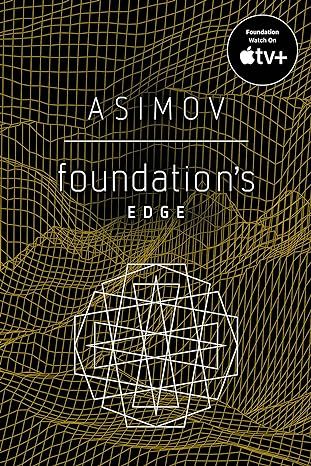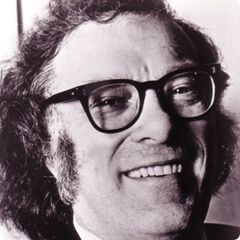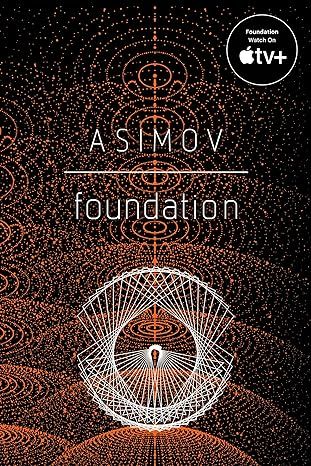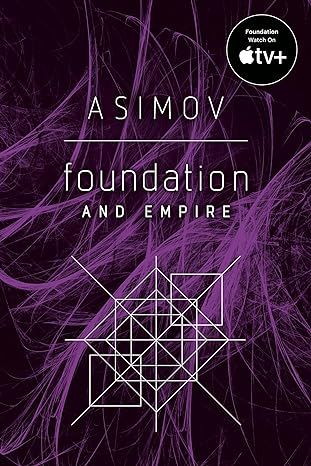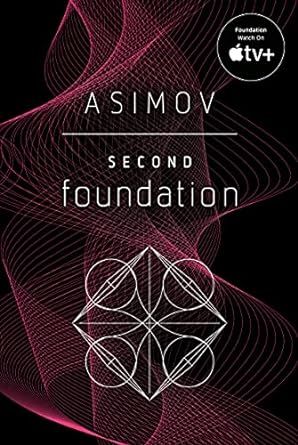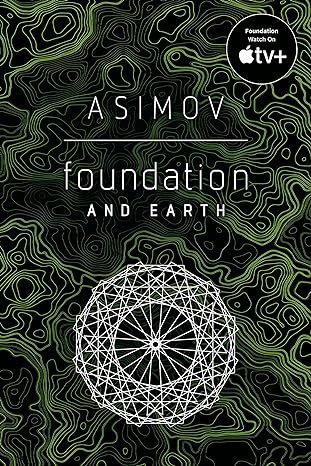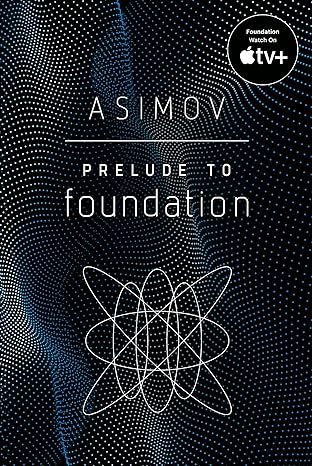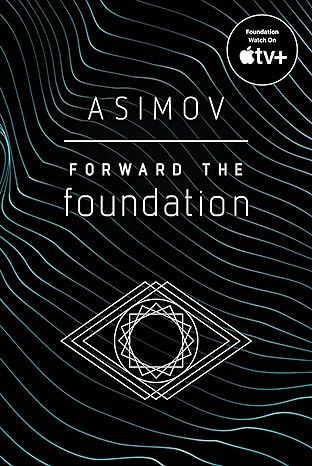Foundation's EdgeKindle
4.7
-
7,652 ratings
The fourth novel in Isaac Asimov’s classic science-fiction masterpiece, the Foundation series
THE EPIC SAGA THAT INSPIRED THE APPLE TV+ SERIES FOUNDATION
At last, the costly and bitter war between the two Foundations has come to an end. The scientists of the First Foundation have proved victorious, and now they return to Hari Seldon’s long established plan to build a new Empire on the ruins of the old. But rumors persist that the Second Foundation is not destroyed after all—and that its still-defiant survivors are preparing their revenge. Now two exiled citizens of the Foundation—a renegade Councilman and a doddering historian—set out in search of the mythical planet Earth . . . and proof that the Second Foundation still exists.
Meanwhile someone—or something—outside of both Foundations seems to be orchestrating events to suit its own ominous purpose. Soon representatives of both the First and Second Foundations will find themselves racing toward a mysterious world called Gaia and a final, shocking destiny at the very end of the universe.
Kindle
$8.99
Available instantly
Audiobook
$0.00
with membership trial
School & Library Binding
$18.80
Paperback
$13.50
Ships from
Amazon.com
Payment
Secure transaction
ISBN-10
0593159985
ISBN-13
978-0593159989
Print length
416 pages
Language
English
Publisher
Del Rey; Reissue
Publication date
November 16, 2020
Dimensions
5.51 x 0.87 x 8.12 inches
Item weight
11.6 ounces
Frequently bought together
Popular highlights in this book
It seems to me, Golan, that the advance of civilization is nothing but an exercise in the limiting of privacy.
Highlighted by 2,348 Kindle readers
The closer to the truth, the better the lie, and the truth itself, when it can be used, is the best lie.
Highlighted by 1,245 Kindle readers
All humanity could share a common insanity and be immersed in a common illusion while living in a common chaos.
Highlighted by 1,125 Kindle readers
Product details
ASIN :
B003EY7JC6
File size :
4975 KB
Text-to-speech :
Enabled
Screen reader :
Supported
Enhanced typesetting :
Enabled
X-Ray :
Enabled
Word wise :
Enabled
Sample
Prologue
The First Galactic Empire was falling. It had been decaying and breaking down for centuries and only one man fully realized that fact.
He was Han Seldon, the last great scientist of the First Empire, and it was he who perfected psychohistory-the science of human behavior reduced to mathematical equations.
The individual human being is unpredictable, but the reactions of human mobs, Seldon found, could be treated statistically. The larger the mob, the greater the accuracy that could be achieved. And the size of the human masses that Seldon worked with was no less than the population of all the inhabited millions of worlds of the Galaxy.
Seldon's equations told him that, left to itself, the Empire would fall and that thirty thousand years of human misery and agony would elapse before a Second Empire would arise from the ruins. And yet, if one could adjust some of the conditions that existed, that Interregnum could be decreased to a single millennium-just one thousand years.
It was to insure this that Seldon set up two colonies of scientists that he called "Foundations." With deliberate intention, he set them up "at opposite ends of the Galaxy." The First Foundation, which centered on physical science, was set up in the full daylight of publicity. The existence of the other, the Second Foundation, a world of psychohistorical and "mentalic" scientists, was drowned in silence.
In The Foundation Trilogy, the story of the first four centuries of the Interregnum is told. The First Foundation (commonly known as simply "The Foundation," since the existence of another was unknown to almost all) began as a small community lost in the emptiness of the Outer Periphery of the Galaxy. Periodically it faced a crisis in which the variables of human intercourse-and of the social and economic currents of the time-constricted about it. Its freedom to move lay along only one certain line and when it moved in that direction, a new horizon of development opened before it. All had been planned by Han Seldon, long dead now.
The First Foundation, with its superior science, took over the barbarized planets that surrounded it. It faced the anarchic warlords who broke away from the dying Empire and beat them. It faced the remnant of the Empire itself under its last strong Emperor and its last strong general-and beat it.
It seemed as though the "Seldon Plan" was going through smoothly and that nothing would prevent the Second Empire from being established on timeand with a minimum of intermediate devastation..
But psychohistory is a statistical science. Always there is a small chance that something will go wrong, and something did-something which Han Seldon could not have foreseen. One man, called the Mule, appeared from nowhere. He had mental powers in a Galaxy that lacked them. He could mold men's emotions and shape their minds so that his bitterest opponents were made into his devoted servants. Armies could not, would not, fight him. The First Foundation fell and Seldon's Plan seemed to lie in ruins.
There was left the mysterious Second Foundation, which had been caught unprepared by the sudden appearance of the Mule, but which was now slowly working out a counterattack. Its great defense was the fact of its unknown location. The Mule sought it in order to make his conquest of the Galaxy complete. The faithful of what was left of the First Foundation sought it to obtain help.
Neither found it. The Mule was stopped first by the action of a woman, Bayta Darell, and that bought enough time for the Second Foundation to organize the proper action and, with that, to stop the Mule permanently. Slowly they prepared to reinstate the Seldon Plan.
But, in a way, the cover of the Second Foundation was gone. The First Foundation knew of the Second's existence, and the First did not want a future in which they were overseen by the mentalists. The First Foundation was the superior in physical force, while the Second Foundation was hampered not only by that fact, but by being faced by a double task: it had not only to stop the First Foundation but had also to regain its anonymity.
This the Second Foundation, under its greatest "First Speaker," Preem Palver, managed to do. The First Foundation was allowed to seem to win, to seem to defeat the Second Foundation, and it moved on to greater and greater strength in the Galaxy, totally ignorant that the Second Foundation still existed.
It is now four hundred and ninety-eight years after the First Foundation had come into existence. It is at the peak of its strength, but one man does not accept appearances--
Read more
About the authors
Isaac Asimov
Isaac Asimov was an American author and professor of biochemistry at Boston University, best known for his works of science fiction and for his popular science books. Asimov was prolific and wrote or edited more than 500 books and an estimated 90,000 letters and postcards. His books have been published in 9 of the 10 major categories of the Dewey Decimal Classification.
Asimov wrote hard science fiction and, along with Robert A. Heinlein and Arthur C. Clarke, he was considered one of the "Big Three" science fiction writers during his lifetime. Asimov's most famous work is the Foundation Series; his other major series are the Galactic Empire series and the Robot series. The Galactic Empire novels are explicitly set in earlier history of the same fictional universe as the Foundation series. Later, beginning with Foundation's Edge, he linked this distant future to the Robot and Spacer stories, creating a unified "future history" for his stories much like those pioneered by Robert A. Heinlein and previously produced by Cordwainer Smith and Poul Anderson. He wrote hundreds of short stories, including the social science fiction "Nightfall", which in 1964 was voted by the Science Fiction Writers of America the best short science fiction story of all time. Asimov wrote the Lucky Starr series of juvenile science-fiction novels using the pen name Paul French.
Read more
Reviews
Customer reviews
4.7 out of 5
7,652 global ratings
Al Azose
5
A soul-satisfying tale of galactic powers deciding on the fate of the Galaxy
Reviewed in the United States on July 9, 2013
Verified Purchase
Warning: Spoiler Alert!
It is 500 years after the establishment of the Foundation on the isolated planet of Terminus. The young and brash councilman, Golan Trevize, has been drawing the irritated attention of the Mayor of Terminus for his overt actions regarding his negative opinions of Hari Seldon’s “Plan”, and the existence of the Second Foundation. And this gets him exiled, along with a 52 year-old scholar of history and mythology, Janov Pelorat.
Yet, it is a very strange exile. He is given a powerful computer-controlled spaceship with the ability to jump through hyperspace with ease, and a “mission” to search for “Earth”, the legendary planet of human origin. Meanwhile, Stor Gendibal, a brilliant and powerful speaker of the Second Foundation, still located on the planet Trantor, prior center of the Galactic Empire, proves to the First Speaker, that a group with mentalic powers greater than their own, are keeping the Seldon Plan on track with far greater accuracy than the Second Foundation could. He further points out that it is Golan Trevize, the councilman of the Foundation Federation, who is the inadvertent pawn of this “anti-mule” group.
And so begins the incredible odyssey of Golan and Janov, as they bond together on their quest through the Galaxy to find Earth, but unknowingly to unravel a mystery which holds the fate of the entire Galaxy in their hands.
There are a multitude of science fiction stories which describe starships speeding across the Galaxy, flitting from star to star or planet to planet, but most of them pay little attention to the details of what that interstellar travel must involve. Asimov, via the delightful and thoughtful conversations of his two protaganists of Golan and Janov, provide the readers with a truly appealing interchange between the two men as they become fast friends in the depths of space. And in that interchange, we are treated to the beautifully explained and articulated thoughts and trade secrets of space travel and mythology – and the “rules” of how to behave on a strange planet - of a time 20,000 years in the future.
Asimov leaves us well entertained with his soul-satisfying climax, as the three “powers” in the Galaxy – the Foundation, the Second Foundation, and the “anti-mules” of the mysterious planet “Gaia” - meet in stalemate in space to let Golan Trevize decide the future fate of the Galaxy.
Read more
4 people found this helpful
William S. Morris
5
Looking for earth
Reviewed in the United States on November 16, 2023
Verified Purchase
This book is obviously written a significant time after the foundation series had become a thing. The science was no longer out of date. The language as also update except for the history professor who sounded like a contemporary of HG Wells. The story moves along in a way that keeps one constantly interested in what's next. The basic idea is that the mayor of terminus gets a thorn out of her side by sending him off on a quest to find the second foundation. She teams him up with a history professor on a quest to find the list origin planet of earth. They're put on a cutting edge advanced space ship with the idea that they'll never return. Well they never find earth or the second foundation, but they find Gaia (Greek for Terra). Seems Gaia has some unique aspects that it has successfully kept hidden until this terminus politician comes snooping around. This gets the mayor, the second foundation, and a few other people all in a dither. The end result is predictable, but still an amusing read.
Read more
Ellen M. Linzey
5
great story
Reviewed in the United States on February 21, 2024
Verified Purchase
Much better than the series, much deeper and thought provoking. I like the series but it is a much lesser thing
Top Isaac Asimov titles
View allBest sellers
View all
The Tuscan Child
4.2
-
100,022
$8.39

The Thursday Murder Club: A Novel (A Thursday Murder Club Mystery)
4.3
-
155,575
$6.33

Sapiens: A Brief History of Humankind
4.6
-
140,302
$13.49

The Butterfly Garden (The Collector, 1)
4.3
-
88,556
$9.59

Things We Hide from the Light (Knockemout Series, 2)
4.4
-
94,890
$11.66

The Last Thing He Told Me: A Novel
4.3
-
154,085
$2.99

The Perfect Marriage: A Completely Gripping Psychological Suspense
4.3
-
143,196
$9.47

The Coworker
4.1
-
80,003
$13.48

First Lie Wins: A Novel (Random House Large Print)
4.3
-
54,062
$14.99

Mile High (Windy City Series Book 1)
4.4
-
59,745
$16.19

Layla
4.2
-
107,613
$8.99

The Locked Door
4.4
-
94,673
$8.53
